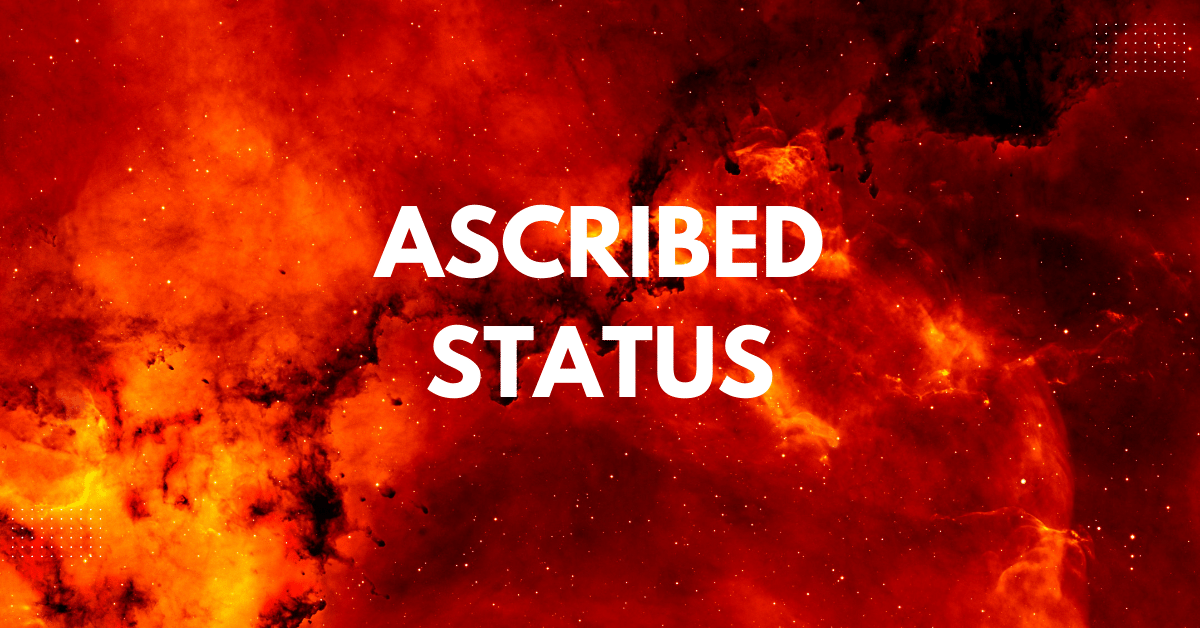Imagine a world where everyone is born with a set of labels, pre-determined by factors outside their control. These labels, invisible yet powerful, could define your career, social standing, even your self-worth. This isn’t a dystopian novel; it’s a reality shaped by the concept of ascribed status. Understanding it helps us navigate the complexities of social structures and the powerful role they play in shaping our lives.

Image: study.com
Ascribed status is a fundamental sociological concept that embodies the labels we inherit at birth or are assigned based on characteristics outside our control. It’s a powerful force, often influencing opportunities, expectations, and even our personal identities. By understanding this framework, we can gain crucial insights into the social inequalities and disparities that exist in our world.
The Foundations of Ascribed Status
The concept of ascribed status has its roots in the work of sociologists like Max Weber, who emphasized the role of social class in shaping individual experiences. He recognized that individuals are born into a particular class, inheriting both advantages and disadvantages based on the economic position of their family. This understanding laid the groundwork for exploring how other factors beyond personal effort could shape an individual’s life.
Defining the Parameters: What Makes Ascribed Status Unique?
Ascribed status can be defined as a social position that is assigned to an individual at birth or involuntarily at a later stage in life based on specific characteristics. These include:
- Race and Ethnicity: Growing up in a society with systemic racism and prejudice, individuals inherit a race and ethnicity that can significantly influence their life experiences, even if those experiences haven’t been directly chosen by the individuals themselves.
- Gender: In many cultures, gender roles and expectations are deeply ingrained, shaping opportunities and behaviors assigned to individuals based on their biological sex.
- Nationality: One’s birthplace and citizenship confer certain privileges and restrictions, even if an individual has never set foot in the country they hold citizenship.
- Social Class: Born into a particular socioeconomic stratum, individuals inherit the advantages or disadvantages associated with that class, including access to resources, education, and opportunities.
- Religion: In diverse societies, religious affiliations can lead to a multitude of social and cultural expectations that shape individual behaviors and social networks.
This highlights the inherent challenge of ascribed status. Individuals don’t actively choose these labels, meaning they often lack control over the social advantages or disadvantages associated with them.
The Impact of Ascribed Status: Shaping Identities and Opportunities
Ascribed status plays a significant role in shaping our identities and life chances. Let’s explore some of its key impacts:

Image: sociology.plus
**1. Shaping Our Self-Perception:**
Ascribed status can significantly influence how we view ourselves, even shaping our self-esteem and aspirations. For example, individuals from underprivileged backgrounds may internalize negative stereotypes and struggle with feelings of inadequacy, while those with privileged backgrounds may develop a sense of entitlement.
**2. Influencing Social Interactions:**
Our ascribed status often determines how we are treated by others and can shape the opportunities available to us. For example, individuals from certain racial or ethnic backgrounds may face discrimination in employment or housing, hindering their ability to succeed.
**3. Affecting Access to Resources:**
Ascribed status impacts our access to essential resources like education, healthcare, and economic opportunities. For instance, individuals from lower socioeconomic strata may lack access to quality education due to limited financial resources, impacting their future career prospects.
Moving Towards Equity: Understanding the Challenges and Opportunities
One cannot deny the pervasive influence of ascribed status across societies. However, understanding its impact also presents an opportunity to promote greater equity and inclusion:
- Challenging Systemic Inequalities: Acknowledging and addressing the systemic inequalities inherent in our social structures is crucial. This involves promoting diversity, inclusion, and equal opportunities to ensure that personal growth and achievement are primarily based on merit rather than ascribed features.
- Promoting Social Awareness and Empathy: Encouraging empathy and understanding between individuals from different backgrounds can help break down stereotypes and prejudices often associated with ascribed status.
- Championing Affirmative Action and Support Systems: Supporting policies and programs aimed at leveling the playing field, such as affirmative action, can provide a much-needed boost to individuals facing systemic disadvantage based on their ascribed status.
Expert Insights: Navigating a World Marked by Ascribed Status
Dr. Maria Garcia, a prominent sociologist specializing in social inequality, emphasizes the importance of self-awareness and critical thinking: “Understanding our own ascribed status and its potential impact is a vital step towards dismantling the systems that perpetuate inequality. It’s through self-reflection and action that we can work towards a more just and equitable society.”
Define Ascribed Status
A Call to Action: Breaking the Cycle
While we cannot choose our ascribed statuses, we can choose how we respond to them. By challenging stereotypes, advocating for change, and fostering greater understanding and empathy, we can create a world where individual potential is celebrated and realized regardless of the labels we inherit at birth.
Let’s continue the conversation! Share your thoughts, experiences, and ideas on how we can navigate a world where ascribed status doesn’t define our potential. Together, we can create a more just and equitable future for all.






